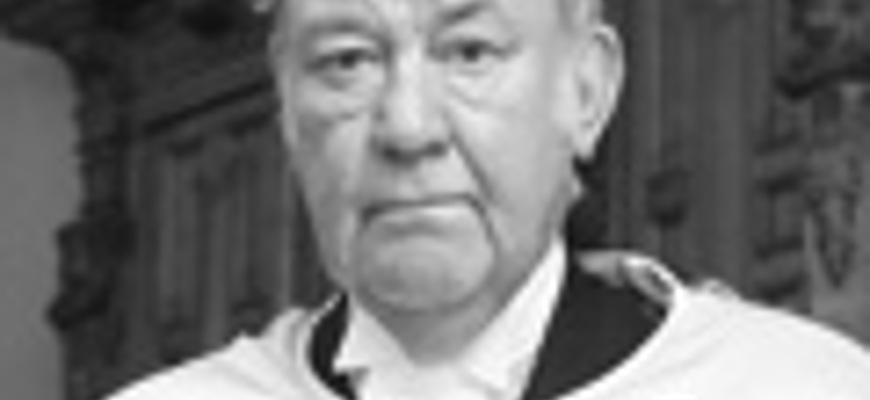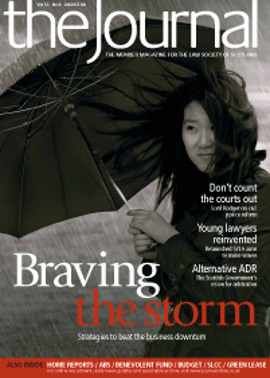Appreciation: Lord Johnston

Lord Johnston, who died suddenly on 16 June, was paid a handsome tribute in the Court of Session by the Lord President on 1 July.
Recording the court’s shock and sadness at losing a second member of the Inner House so soon after the death of Lord Macfadyen, Lord Hamilton related that Alan Johnston, the son of the popular judge Lord Dunpark, was educated at Edinburgh Academy and Loretto School, and in law at Jesus College Cambridge and Edinburgh University, before being called to the bar in 1967. “Even by then”, he observed, “he was a character who could readily be described as larger than life.”
Apart from his busy practice first as a junior and from 1980 as a silk, the Lord President identified the most striking features of Lord Johnston’s years at the bar as his contributions to the Faculty, first as treasurer from 1977 to 1989, and from 1989 until December 1993 as Dean. His astuteness in financial matters was of great benefit to the Faculty and he identified several properties in the vicinity of Parliament House suitable for development as Faculty premises, without which it was difficult to imagine how the Faculty could have expanded and prospered as it had.
“But it was as Dean of Faculty that he truly came into his own. His energy and enthusiasm were boundless. Having succeeded a line of perhaps more cerebral holders of that office, he carried the Faculty forward with such gusto and flair as had rarely been seen before. He guided it carefully in the troubled waters which followed the extension to certain solicitors of rights of audience in the Supreme Courts. He was always conscious of the fact that, if the Faculty was to survive, it was necessary to demonstrate that its members showed true excellence in the performance of their professional duties. To that end he was instrumental in setting in place the now familiar arrangements for the training and education of prospective and current advocates.” He also set about improving the Faculty’s relations with the public.
Lord Hamilton commented that when Lord Johnston was installed as a senator in January 1994, “Seldom had the court welcomed to its ranks someone so large in person and at the same time so large in personality. As a trial judge, he handled juries with consummate skill – not least by taking care not to bore and distract them with lengthy charges, but rather by keeping his directions succinct and to the point.” He mastered the complex world of employment law as Scottish judge in the EAT from 1997-2005. “In the writing of civil judgments he never aspired to be a Jane Austen; but the administration of justice is not secured by Ciceronian cadences but by the giving of prompt and effective rulings. In that Alan excelled.”
After he joined the Second Division in 2005, “It was perhaps in appellate criminal business that he most excelled as a judge. He made valuable contributions to many important judgments in conviction appeals, but it was as chairman of the sentencing appeal court that his best work was done.” Explaining the heavy burden of preparatory reading imposed on such chairmen, Lord Hamilton continued: “Alan applied himself with great diligence to that task. He always had a complete grasp of all the business in hand. The result was that in court it was dispatched with great expedition. Practitioners in that field held him in very high regard. The prospect of dealing in his absence with this branch of the business is daunting in the extreme.”
The Lord President went on to pay tribute to Lord Johnston’s out-of-court contributions to the court’s work, in which he regularly passed on information gained from the many friends he had made in other jurisdictions. “He was a mine of information as to what was or might be happening elsewhere – often drawing to our attention matters of which we should be aware.” During his service on the Judicial Advisory Group, tasked with liaising with administrators over the redevelopment of Parliament House, “Many a problem was identified and resolved by his insightful and direct approach.” He was chairman of the working party set up to consider the practical aspects of the jurisdiction to deal with contempt of court. “His absence from that group’s further deliberations is a particular loss.”
The Lord President added: “Alan was a man with many, many friends and interests. The overcrowding of the Canongate Kirk last Monday is witness to that. He was not a bookish lawyer. He recognised and gave effect to the important principle that those who have to judge others and their affairs should not be cloistered individuals but have real experience and understanding of the community which they serve.” He instanced Lord Johnston’s service on many charitable and other trusts; as a governor, and chairman of the governors, of Loretto School; as a founding trustee of the Jean Clarke Foundation for Legal Education; and on the governing body of Heriot-Watt University, which in 2001 awarded him the degree of Doctor of the University.
He loved the outdoors and the sports of the countryman, and was a keen golfer. He was also a man of great personal humour with a ready facility to tell tales against himself. “His laughter was infectious. Although at times verging on the bluff, he was never pompous. While strongly independent of mind, he was extremely modest”, able to recognise and acknowledge any mistake he might have made in judging others.
“He leaves a widow, Anthea, three sons and a grandson. To them, to his other close relatives and to his very many friends the court expresses its sincere condolences. He will be sorely missed.”
In this issue
- Where have we come from, where to next?
- Shifting sands
- A rank bad rule
- Braving the storm
- Civil justice: where next?
- Title Conditions Act: new registration procedures
- Young lawyers reborn
- Shining some more light...
- Power to the tribunal?
- Piece by piece
- The poor in our midst
- The Society's future role in complaints handling
- Appreciation: Lord Johnston
- Professional Practice Committee
- Facing the lean years
- It's a web 2.0 world
- Questions, questions
- Bare necessities
- Coming on the blind side
- Relocation, relocation
- Worse than the disease?
- Sleeping bounty
- Scottish Solicitors' Discipline Tribunal
- Website reviews
- Book reviews
- Industry standard
- Meet the committee
- What's in a motto?
- Leasing by example
- Good call?
- Home reports - the practice questions






